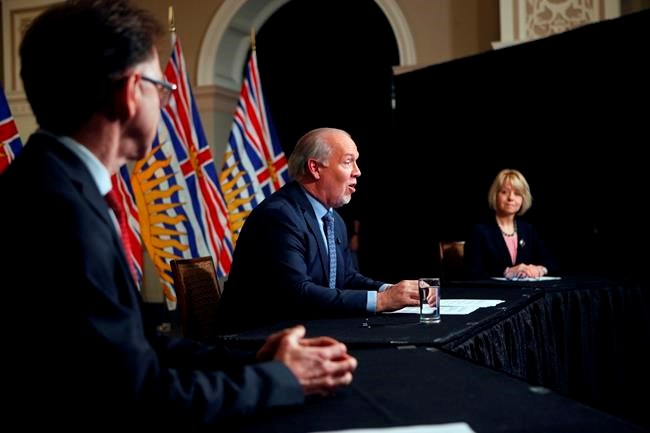VICTORIA — COVID-19 created a backlog of surgeries that could take two years to clear, even with an "ambitious plan" announced to increase health-care capacity, said Health Minister Adrian Dix.
The government said Thursday there are 30,000 patients whose surgeries have been cancelled or weren't scheduled because of COVID-19 health restrictions.
It says those patients joined or remained on an existing waiting list, bringing the total to 93,000.
"It's impossible for us to catch up without significant program changes and increased capacity," Dix said during a news conference.
"We will do this in the safest way possible for patients and providers."
The province announced two more deaths on Thursday related to COVID-19, bringing the number of people who have died to 126.
B.C. has 33 new cases for a total of 2,288, including 1,512 who have recovered.
The first year of the plan will cost $250 million, and includes hiring additional staff, expanding hours, opening new and unused spaces, and turning to private clinics.
The government said it will start calling each patient this week to confirm that they want to proceed with surgery while COVID-19 is still a concern.
Beginning May 18, surgical services will resume and increase capacity over four weeks to near-normal levels.
By mid-June, all existing operating rooms should be running at full capacity. Over the next four months, the government plans to extend daily hours of operation, add weekend surgeries and open new operating rooms where available.
Health officials warn that the projected timelines are "highly vulnerable" to external forces such as new surges of COVID-19. For every 10 per cent of non-urgent cases that go unaddressed each month, the timeline is extended by up to half a month, they said.
The pandemic also erased any gains the government had achieved as part of a five-year plan to boost surgical and screening capacity. In the last three years, 35,000 more patients were able to access surgery and wait times for hip, knee and dental surgeries dropped, the government said.
However, Dix said the measures taken to clear the short-term backlog will have the added benefit of increasing capacity in the longer term.
"Our surgery renewal plan beginning this month is going to be a massive renewal. It is a hugely ambitious plan that will keep up with new demand for new surgeries and clear the backlog created by COVID-19," Dix said.
The new staffing plans involve offering all existing, reinstated and graduating nurses the opportunity for regular permanent employment. This year, 1,550 nurses are graduating and among 2,404 existing operating nurses, 1,331 are working full-time equivalent hours.
The government will also target and recruit surgeons, anesthesiologists and support staff like housekeepers and medical device processors.
Urgent and emergency surgeries, the majority of which were cancer-related, have continued throughout the pandemic.
Provincial health officer Dr. Bonnie Henry said with viral cases under control and new safety and screening protocols in place, health-care providers can move to a different approach.
"We can safely resume surgeries and we no longer have to assume that everybody has this, we can safely assume that most patients do not have COVID-19," she said.
Henry told reporters during a second news conference on Thursday that every other pandemic in recorded history has had at least two waves, while some have had even more.
She said she didn't know whether that would be true for COVID-19, or if the second wave would be worse than the first but there is not enough immunity in the world right now to prevent it.
The human cost of cancelling surgeries is not known but Henry said the government is working on an analysis of human health during the pandemic.
The death rate from all causes has remained relatively stable in B.C., although Henry said the pandemic may have had unexpected consequences. Some people avoided going to the hospital for emergencies and illicit overdose deaths also spiked in March.
Premier John Horgan acknowledged the sacrifice of B.C. residents who have suffered in pain while awaiting new surgical dates. He urged the public not to forget them as we enter the "new normal" and said it's not time to let down our guards against COVID-19.
"Because of those sacrifices, we've been able to move forward."
— By Amy Smart with files from Hina Alam in Vancouver.
This report by The Canadian Press was first published May 7, 2020.
The Canadian Press



